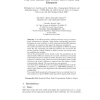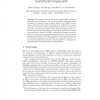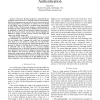38 search results - page 4 / 8 » A Practical Key Recovery Attack on Basic TCHo |
CHES
2006
Springer
13 years 11 months ago
2006
Springer
It is well known that a malicious adversary can try to retrieve secret information by inducing a fault during cryptographic operations. Following the work of Seifert on fault induc...
AFRICACRYPT
2009
Springer
14 years 2 months ago
2009
Springer
We present the first simple power analysis (SPA) of software implementations of KeeLoq. Our attack drastically reduces the efforts required for a complete break of remote keyless...
CCS
2010
ACM
13 years 4 months ago
2010
ACM
Cryptographic systems and protocols are the core of many Internet security procedures (such as SSL, SSH, IPSEC, DNSSEC, secure mail, etc.). At the heart of all cryptographic funct...
PKC
2007
Springer
14 years 1 months ago
2007
Springer
At PKC 2003 Paeng, Jung, and Ha proposed a lattice based public key cryptosystem(PJH). It is originated from GGH, and designed as a hybrid of GGH and NTRUEncrypt in order to reduce...
FC
2010
Springer
13 years 11 months ago
2010
Springer
—This paper discusses public-key authenticated key agreement protocols. First, we critically analyze several authenticated key agreement protocols and uncover various theoretical...



